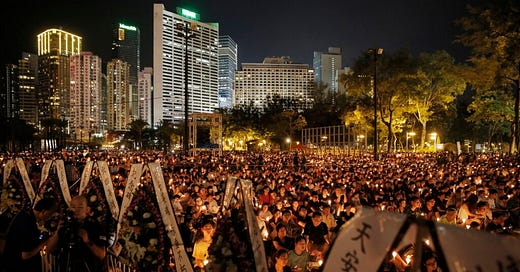They can fill the jails, create an atmosphere of fear and re-write history and but they cannot extinguish hope.
Remembering the 1989 Tiananmen Square massacre
Until they were stopped tens of thousands of Hongkongers gathered each year to mark the day of the massacre
Until the 2020 crackdown Hong Kong was the only place under control of the Chinese Communist Party (CCP) where people could gather on June 4 to commemorate the 1989 Tiananmen Massacre when the tanks moved in to crush pro-democracy protests. Now these gatherings are banned in Hong Kong and the memory can only be preserved overseas.
What became known as the June 4 Vigil in Hong Kong was always a moving event, mourning the dead and recognizing the courage of those who died, were injured and thrown in jail. Through the tears, the quavering voices singing the anthems associated with the democracy movement, there was always the hope that the days of the CCP dictatorship were coming to an end.
People in the Hong Kong diaspora are keenly aware that living in freedom they have a responsibility to keep alive both the memory of the June 4 massacre and the crackdown in Hong Kong thirty years later.
In both instances the glimmer of hope that the dictatorship would yield gave way to a doubling down on repression. This is why on these occasions the banned ‘Glory to Hong Kong’ anthem of the 2019 uprising is always sung. We can live in freedom but have left behind a new generation of political prisoners, a paranoid regime, fortified by informer hotlines, a weaponized legal system and seemingly endless purges of the smallest signs of dissent.
Remarkably in this atmosphere the extraordinarily brave barrister, activist and journalist Chow Hang-tung, isolated in a prison cell, went on a 36-hour fast to reaffirm her commitment to keeping the memory of Tiananmen alive.
She reminds us of courage in the face of a legal system which will ensure that she is kept behind bars for many years to come. The day after her hunger strike ended the police entered the cell holding the irrepressible Joshua Wong, where, after almost completing his prison sentence, he was charged with new offenses carrying the threat of a lifetime behind bars.
Jimmy Lai, who has become Hong Kong’s most famous political prisoner in succession to Mr. Wong, may well also remain behind bars for the rest of his life. His major ‘crime’ consists of having dared to publish the Apple Daily newspaper, a steadfast advocate for democracy and, worse still, from the regime’s point of view, highly popular until it was closed down.
Those who joined the Hong Kong exodus are largely safe overseas, although the regime and its masters in Beijing continue to harass the so called ‘most wanted’ members of the diaspora. Most of us are spared this outrageous extrajudicial abuse. Members of the diaspora who were previously politically active or indeed engaged in the now dangerous occupation of journalism or civil society activity, wonder what would have happened had we stayed.
This is why we have mixed feelings. On the one hand there is relief to be out of the regime’s reach and on the other guilt, because others, remaining in Hong Kong, are bearing the consequence of having dared to hope for a better and more free society. From afar we see some of Hong Kong’s finest citizens marched off to jail on trumped up charges. Many of them are friends, yet we sit hopelessly by as the regime runs out of people to arrest and starts harassing family members of the accused.
The pattern of repression being played out in Hong Kong is familiar in countries where repressive regimes understand their fundamental lack of legitimacy and respond by filling the jails with people who they know, in their heart of hearts, have popular support. In so doing they implicitly acknowledge their insecurity as political leaders, reliant on force rather than consent.
The South African apartheid regime jailed Nelson Mandela for 27 years, not for his alleged crimes but because they were well aware that a free Mandela allowed to put his case to the public by way of election would render his jailers to the dustbin of history. And so it proved.
Marwan Barghouti, a Palestinian leader, often compared to Mr Mandela, has been sitting in an Israeli jail since 2002. Not only have opinion polls regularly shown him to be Palestine’s most popular leader but he has also been an advocate of a two-state solution for the Israel Palestine conflict. He poses a great threat to the current Netanyahu government which is determined to never allow statehood for Palestinians and fears the emergence of someone with stature to be the true representative of his people.
China has no single person who embodies an alternative to the regime but has made itself a world leader in jailing dissidents, ethnic cleansing of minority communities and installing the most terrifying of surveillance networks.
The Chinese dictatorship is also the most avid re-writer of history because they believe that controlling the narrative of the past justifies their continued rule.
Refusing to accept these lies and insisting on truth and accountability for the regime’s crimes is why June 4 has become such an important day in the calendar of freedom loving people. To refuse to forget is to resist, to keep alive the memory is to work for a better future.





Thank you Steve for naming the courageous resistance imprisoned in HK. There will come a time when the powerful now abusing their power will be consigned to the dustbins of history. Our responsibility is to try to speed up that time.